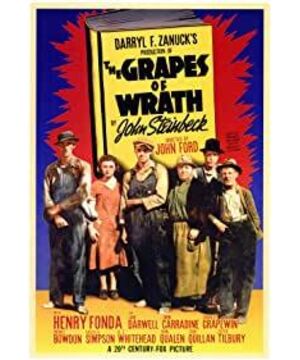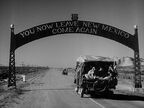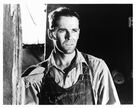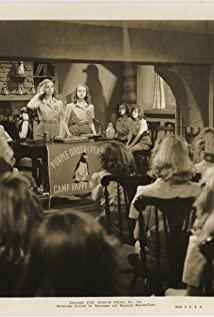Imagination is often constrained by reality. As reality develops, imagination must be constantly updated to attract attention. Unlike this, emotions have continuity, and those great emotions are as moving today as they were 100 years ago. Tomorrow, there will be more outstanding ghosts using newer methods to create more intense and strange plots, but the love for the land, the care for the family, the hope for the family, these feelings that everyone will feel, are not in the "Angry At the beginning of "Grapes" is Henry Fonda's skinny face as a sculpture, eyes mixed with anxiety and eagerness to express? The drought of the land is reflected in the pastor's distracted expressions, and the nervousness and persistence of neighbors who will not leave the land to death reflect the flesh and blood connection to the land. We should be grateful to these great actors. They did not pursue the "shock of a few shots". They used their souls to perform. The same feelings of ancient and modern are preserved by them and left for us to taste 60 years later. .
However, this is not the most noteworthy aspect of this film. With the natural disasters in Oklahoma in the 1930s, the dry land could no longer carry so many labors, and large groups of people were forced to leave the land and migrate west, hoping to find a job. It is conceivable that the number of unemployed people far exceeds the number of jobs, and people's tolerance limits have been pushed farther and farther. The first job accepted was in the wage struggle between employers and labor: the minimum wage cannot guarantee basic needs, and the laborers strike, and the plantation recruits other hungry workers. Pastor Casey persuaded John John to unite and strike to achieve the goal of increasing wages, but he was killed for it. Unsurprisingly, the consequence of failing the White House is that later generations will never get enough wages. The Johns left the job, and the struggle between the workers and the management ended in failure.
When the Johns’ family was on the brink of desperation, they suddenly fell into the ideal country: In this shelter called the Ministry of Agriculture, there is no police, everyone is autonomous, the community is managed by elected representatives, and people rely on working for the community to make a living. There are sanitary facilities, there are schools for children. Seeing this, I don't think it is a "Ministry of Agriculture Protection Institute". This is the picture of utopian socialism. The surprises of the old mother, younger brothers and sisters, and even John himself explained that this is the life that people who have lost their land and all their property most expected. Of course, the "authorities" would not be happy about this: they tried their best to create riots and wanted the police to intervene in the community, but they were blocked by the people's commune.
When the migration began, John once asked inexplicably: Whenever there is a fight, people will talk about "red". What is "red" on earth? In the end, when he was hunted down and had to flee, faced with the question of where his mother could find him, he said something like this: "Perhaps as Kathy said, man has no self-soul, only one big soul, which belongs to all. The human soul. Therefore, it does not matter... I will be in the dark, everywhere, as long as you can see where there is me; as long as there are people struggling to survive, there will be me; as long as there are rules to beat people , I will be there; I will be in places where people scream and children laugh, when they laugh when they are hungry, knowing that dinner is ready; when people eat their own food and live in their own houses , I will also be with them..." At this time, he had personally answered what is called "red", and embarked on this path.
Another person who took this path was Pastor Casey. He was a pastor, but he lost his divinity: he begged God to save this dry land, but God failed to respond. So he went to find salvation on his own, united for the workers to fight for higher wages, and died for it. As a soul-saving person, he just took a different form: from attaching to God to devoting himself to the common welfare of workers.
At the end of the film, John left the ideal country, and the family also left under the leadership of his old mother, looking for another piece of paradise firmly and hopefully. So, is all that John has done worthwhile? Have they finally found a paradise? The film has no answer, but the director's attitude is undoubtedly positive. This leads me to believe that even though the assumptions of rational people have been universally applied, there is always a deep desire in people's hearts to fight for the unity of the world and the common welfare of all mankind. This is a kind of spiritual power, and has nothing to do with the education of the xx party, and it has nothing to do with the specific path the world has chosen in the past 100 years.
Outside the article: Henry Fonda’s daughter, Jane Fonda, had to publicly publish a "reform statement" in the media during the anti-communist high pressure created by the McCarthy Act in the United States in the 1950s. During the same period, Chaplin was forced to leave the United States for the same reason, settle in Switzerland, and never returned.
View more about The Grapes of Wrath reviews











